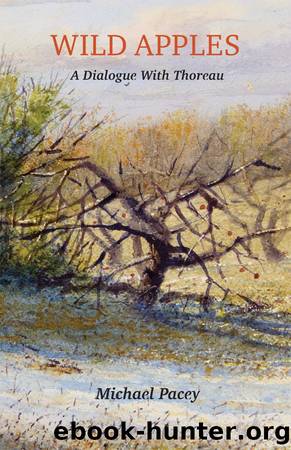Wild Apples by Michael Pacey

Author:Michael Pacey
Language: eng
Format: epub
Publisher: Pottersfield Press
Ventriloquism and Mimicry
Undated, 1850: I noticed a singular instance of ventriloquism today in a male chewink singing on the top of a young oak. It was difficult to believe that the last part of his strain, the concluding jingle, did not proceed from a different quarter, a woodside many rods off.
September 25, 1855: Scare up the usual great bittern above the railroad bridge, whose hoarse qua qua as it flies heavily off a pickerel-fisher on the bank imitates.
Invitation to a game of hide-and-seek:
throwing your voice so it seems to come
from some other source;
so a maybe-mate has her interest piqued,
but canât quite place you. So predators,
listening, canât pin you down.
A male jay, chewink, robin seeking a mrs,
puts it out there, but beguilingly, posts
no box-number, nor e-mail address.
A pine warbler, catbird, bluebird sounds
as though heâs far off, at the top
of that distant elm maybe, when in fact
heâs seven or eight feet away â
as if lip-synching â giving you
the area code, but not his number â¦
In another quarter of the forest,
you hear a catbird, say, or brown thrasher,
goldfinch, performing note by note
a simulacrum. Polishing
his own song, a series of scales
repeated over and over, then
starts to freestyle, riff.
Catbird imitates cat, then crow â
its inquisitive char char â switches
mid-phrase, throwing in blackbird airs â
sprayey warbles, half-whistle â to make
his music distinctive: this cat can swing!
Thrasher mocks nasal gnah gnah
of a nuthatch, then works on his wren
impersonation; goldfinch scratch-tracks
a thrasher, while a white-throated sparrow
apes a catbird â both mocking the mocker â
and a purple finch does a canary run heâs heard
playing in a cage somewhere, maybe
wintering over in North Africa;
then turns into a robin. Marsh warbler
claims title of best rapper out there: chops
the beat of more than two hundred species
speeded up or slowed down
accelerando, ritardando: the master of tempo.
Many dissertations have been ruined
by mockingbirds, starlings â
they imitate everything! Traffic noise,
the squeal of tires, brakes, sirens,
dog barks, buzz of fluorescent lights.
One fool spent months in the forest,
a tape-recorder beside him unspooling
canned tunes of dozens of birds, to see
if he could school a flock of starlings.
In the end they ignored the songs,
but got the creak of his reels turning,
hiss of his tape, hack of his cough
down pat.
Every thesis
concludes with this sentence:
âThere is no clear reason for mimicry
in the avian world.â Sure, shrikes
mimic songbirds to lure them near,
impale their carcasses upon
some thorny spike,
to be consumed at their leisure;
but songbirds copying songbirds
seems mere showmanship,
showing off, slamming. Nabokov
scoffed at recondite toffery
in his lifelong study of butterflies
and moths: a butterfly looks like
a leaf â not only is each detail
remarkably rendered â but markers
mocking grub-bored holes and
aphid eggs are generously thrown in,
âfar in excess of a predatorâs
power of appreciation.â
Concluded that nature, like art,
is all about deception, hoaxery.
With birds, exuberance of the music,
the making, masking becomes
an end in itself. From Bach
to be-bop to rap, the luxuriance
of reworking the figure, the fugue
becomes its own luxury. Theme
and variation, improvisation,
the song its own gaudy plumage â
to be best in your hood, on your turf â
someone the girls take note of, who
puts them in the mood. Counter-singing,
â hooks,
Download
This site does not store any files on its server. We only index and link to content provided by other sites. Please contact the content providers to delete copyright contents if any and email us, we'll remove relevant links or contents immediately.
This Was Meant To Find You (When You Needed It Most) by Charlotte Freeman(984)
Side by side with Bob Dylan by Gudrun Heller(622)
The Strength In Our Scars by Unknown(558)
Be the One by Eileen Lamb(424)
Non.Fiction.Love.Poems.1981 by Steel Danielle(256)
Erotica Romana by Johann Wolfgang von Goethe(236)
Asimov's Annotated Paradise Lost by John Milton Isaac Asimov (editor)(175)
The Funny Thing About Death by Jo Caulfield(137)
LES PARADIS ARTIFICIELS - OPIUM ET HASCHISCH by Charles Baudelaire(137)
Unexpected Vanilla by Lee Hyemi(136)
Table-Books by KETTLE Andrew(132)
untitled by 0470026669)(132)
Tea with the Midnight Muse by Shiloh Sophia(126)
Cool and Collected Poems by Mois Benarroch(122)
The Black Echo the Poet by Connelly Michael(119)
Bound by L.A. Smith(117)
No Gravity by Rudy Francisco(113)
untitled by 0764597760)(111)
[A House of Air 01] ⢠A House of Air by Fitzgerald Penelope(107)
